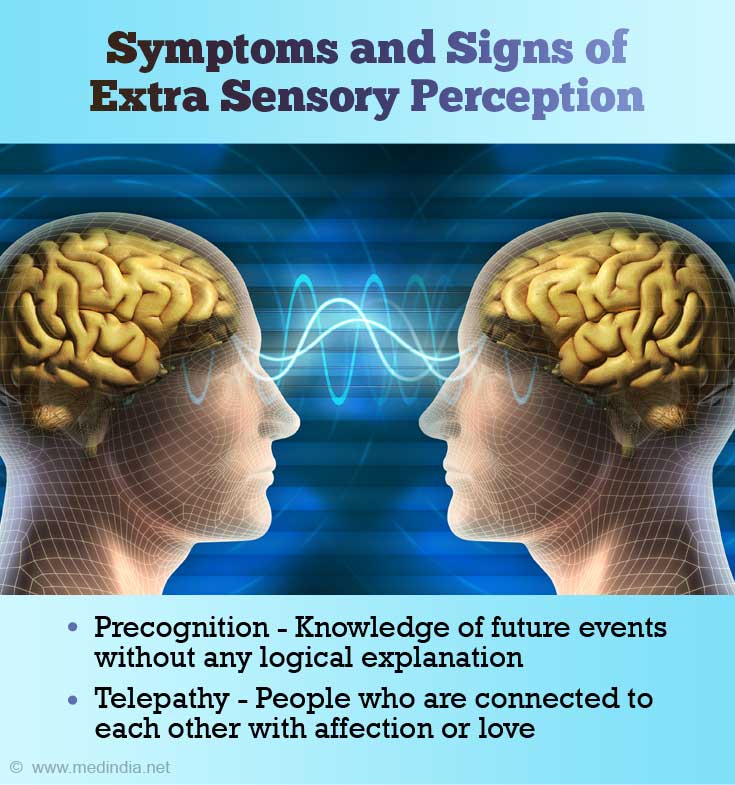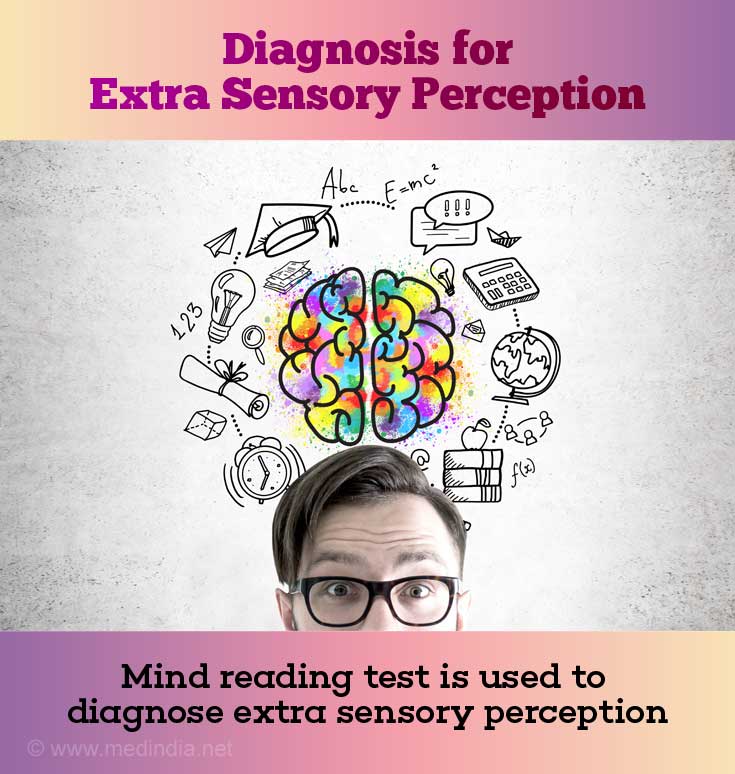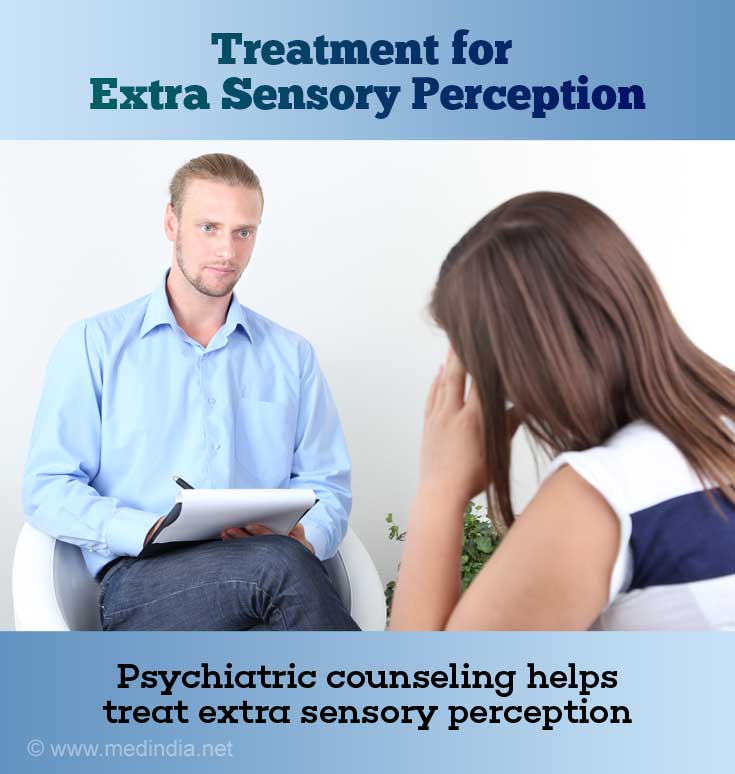- Extrasensory Perception and the Brain Hemispheres: Where Does the Issue Stand Now? - (https://pdfs.semanticscholar.org/8522/74fc3ca61120826e09423f969c8e2a3b4f88.pdf )
- ESP: What Can Science Say? - (https://undsci.berkeley.edu/article/esp )
- Probability misjudgment, cognitive ability, and belief in the paranormal - (https://www.ncbi.nlm.nih.gov/pubmed/12031145 )
- Rethinking Extrasensory Perception: Toward a Multiphasic Model of Precognition - (https://journals.sagepub.com/doi/full/10.1177/2158244015576056)
- Relevance of Para-psychology in Psychiatric Practice - (https://www.ncbi.nlm.nih.gov/pmc/articles/PMC3056186/)
- Replication and Meta-Analysis in Parapsychology - (https://pdfs.semanticscholar.org/0f65/b2d0505c3abbe05055313b681531ab131662.pdf)
What is Extra Sensory Perception?
Extra sensory perception (ESP) is a controversial topic in neuroscience and psychology. Many of us have this feeling that certain things happen by coincidence. For example, we think of someone and we receive a phone call from that person soon after. Another instance is when we look at someone at a distance and they turn around at the same moment to meet your eyes. There are other instances when some people are able to foresee the future. A very popular example is that of Nostradamus who, in the 16th century, predicted many events that were to occur beyond his lifetime. All these phenomena are characteristically termed as extra sensory perception or ESP. (1✔ ✔Trusted Source
Extrasensory Perception and the Brain Hemispheres: Where Does the Issue Stand Now?
Go to source)
The concept of paranormal behavior is an area that intrigues us. Numerous books, movies, and television shows have been created on this concept. Tales of paranormal behavior pique our curiosity without making us actually understand what causes this behavior. This article informs you of what is paranormal behavior in the form of extra sensory perception and explains possible reasons for this behavior. There are more questions than answers in this field. Studies are ongoing to give us a better idea of this condition.(2✔ ✔Trusted Source
ESP: What Can Science Say?
Go to source, 3✔ ✔Trusted Source
Probability Misjudgment, Cognitive Ability, and Belief in the Paranormal
Go to source)
Para-psychology analyzes situations, experiences, and behavior that are out of the ordinary. Such unusual circumstances cannot be explained in finite terms. Para-psychology has 2 branches: psychokinesis and extra sensory perception.
Psychokinesis is a term that defines events that occur without the involvement of any living being. Extra sensory perception defines perceptions or impressions our brain receives or communication that occurs without the involvement of any of our communicating sensory organs (eg. eyes, mouth, or ears).
Extra sensory phenomena are classified into 3 categories:
- Precognition: Knowledge of future events without any logical explanation is a sign of precognition.
- Clairvoyance: Awareness of unknown objects or hidden materials without any prior contact or knowledge of the same.
- Telepathy: Communication between people separated by a geographical distance with no possible form of prior contact.

Causes of Extra Sensory Perception
Parapsychologists believe that the existence of extra sensory perception may be due to the presence of a certain type of brain activity. Attempts have been made to understand the exact region of the brain that mediates or regulates the function of extra sensory perception. Studies indicate that the right hemisphere of the brain appears to be activated during ESP.
Emotional trauma due to displacement, death of a close relative, or friend can predispose an individual to experiencing ESP.(4✔ ✔Trusted Source
Rethinking Extrasensory Perception: Toward a Multiphasic Model of Precognition
Go to source)
What are the Symptoms and Signs of Extra Sensory Perception?
The different types of extra sensory perception manifest themselves in different ways. Based on the situation, the individual experiences characteristic symptoms like:
- Precognition: A person who experiences precognition can either have a vague idea or a clear knowledge of the sequence of future events. The individual may experience this state either while awake or while dreaming. Precognitive experiences have a characteristic of being unpleasant. The premonitions make the individual nervous and
depressed if he is unable to prevent their occurrence. (5✔ ✔Trusted Source
Relevance of Para-psychology in Psychiatric Practice
Go to source) - Telepathy: Telepathy is usually observed between people who are connected to each other with affection or love. Sometimes close friends, close family members, or married couples experience this unexplained communication without the use of their sensory organs. There is an emotional component to this phenomenon. This kind of communication includes physical symptoms as well that cannot be explained by scientific means.
Diagnosis of Extra Sensory Perception
Mind reading: This forms a part of forced-choice experiments that were first introduced by J.B. Rhine in the 1930s. He used a deck of cards and required the participant to guess the card being looked at by the person conducting the experiment. The experiment can be performed with symbols, numbers, alphabets, and others.

Free-response studies: This involves different experiments such as inducing a dream state or a hallucination state. The individual goes into these states because the internal noise that persists in the brain, is reduced.
Remote viewing: This is a type of free-response study where the experimenter sits with the patient while an assistant drives to an unspecified location before returning to take the patient to the same location. The experimenter and the patient are both unaware of the location. This is a way to identify if the patient has an idea of the location without any prior information.
A study in 1990 showed that patients with ESP who were tested, were inclined to be more selective and did not repeat their choices due to their heightened perception that there must be some issue that such repetitive questions are occurring. Thus, randomness had a very different effect on individuals with ESP. Another study connected this observation with poor reasoning capacity of individuals and the persistent belief in the fact that everything occurring in the world was governed by paranormal behavior.(6✔ ✔Trusted Source
Replication and Meta-Analysis in Parapsychology
Go to source)
Treatment for Extra Sensory Perception
Psychiatric Counseling: Patients with ESP are unable to explain their unusual experiences and need to talk to a psychiatrist to understand what is happening to them. Hence, based on the condition, psychiatrists analyze the case and provide appropriate counseling.

Precognition: Psychiatrists while evaluating their patient should confirm and establish the precognitive nature of the patient. They should also verify that all the foreseen events turned out true in the patient. The patient may unduly blame himself for all disastrous events even if only one of them was correctly predicted.
Telepathy: Sometimes patients experience physical symptoms that bear resemblance to those experienced by a close friend or relative separated by time and geography without any prior knowledge. In such cases that the patient should be asked about any emotional trauma or if anyone close to the patient has undergone similar physical symptoms.









